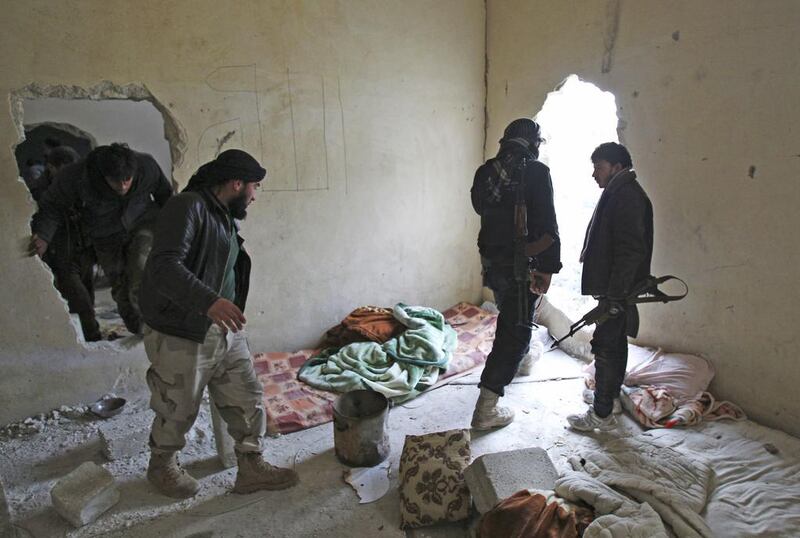Lucrative Qatari hostage payments bankrolled a feared Al Qaeda-linked militant group in Syria, one that has grown to become the most effective and powerful extremist faction in the war-ravaged country where it has imposed its extremist vision and kidnapped an American journalist, wealthy Gulf royals, UN peacekeepers, and even a group of nuns.
In at least one of those cases – the kidnap of nine Qatari royals and 16 Qatari nationals by a Shiite militia in southern Iraq – Doha siphoned millions, according to Iraqi officials, to that very group: the Nusra Front, now leading an Islamist alliance known as Hayat Tahrir Al Sham (HTS).
Exchanges leaked in the US press on Saturday revealed how the tiny Gulf state had been shaken down and plundered of at least $275 million (Dh1bn) by various parties across sectarian lines in return for its nationals. Most concerning for Qatar’s Gulf neighbours, who are so focused on the battle against Al Qaeda, was arguably the large payment to HTS as part of the deal.
That extremist group is one experts say has boosted its ranks and presence in northwestern Syria as the seven-year civil war has progressed, consolidating its authority in that corner of the war-wracked country to become the most dangerous militant group in Syria, bankrolled at least indirectly by Doha.
"Al Qaeda have benefited significantly from the strategic focus of the West on ISIS, and the focus of the Russians and the Assad regime on other groups. That has allowed them a breathing space that they almost certainly would not have had otherwise," Jason Burke, expert on extremism and author of several books focusing on the group, told The National.
“They are a massive potential threat," he continued. “You’ve got a lot of people who are very experienced, who have shown themselves committed to an extremist, agenda, and who have shown themselves ready to use violence."
It remains unknown how many of Doha’s millions have entered the hands of HTS’s fighters and its leader, Abu Muhammad Al Jolani, who has appeared several times on Qatari state broadcaster Al Jazeera. But the US-prescribed terrorist organisation has now become Syria’s most active militant group, entrenching itself across Idlib and beating back ISIS cells and western-supported rebel groups.
HTS now boasts a religious police force, is battling the regime of Syrian President Bashar Al Assad on several fronts in the country’s northwest and Al Jolani has pledged to spread Islamic law across Syria, calling on his supporters to wage “a war of ideas, a war of minds”. That it has yet to direct attacks outside of Syria belies the danger this group and its extremist ideology poses, analysts say.
_________
Read more
‘I felt like life was beginning again’: Qataris kidnapped in Iraq speak of joy at release
Iraq says it still has Qatari money sent to free ruling family members
_________
But it is not only security officials from the West to the Gulf who fear the group, but residents living under its rule, too. Growing local resistance to the group’s domination of Idlib is evident in increasingly frequent protests against HTS chief Al Jolani. Protesters chant slogans personally targeting Al Jolani in scenes reminiscent of the earliest protests against Al Assad.
"One of the common phrases going around at the moment is 'Assad is ruining the hospitals from the air, Al Jolani is ruining them from the ground' – they are starting to be seen as two sides of the same coin," a western intelligence source told The National.
“The demonstrations [against HTS] are increasing in both confidence and size, if you see the videos coming out of Idlib at the moment, it’s a real tinder box," the source continued.
A series of assassinations by unknown parties in recent weeks have also rocked the group. "It's not just one entity doing it, there are a lot of groups that have an interest in doing this. One is definitely Turkish intelligence; we know that for a fact in terms of their foreign policy of containing HTS. Idlib is awash with Turkish subversion against HTS," the intelligence source suggested to The National.
The group have also not fully recovered from the resignation of Saudi-born cleric Abdullah Al Muhaysini in September 2017, which security officials say weakened the group's authority among locals and rebels in Idlib. His unwillingness to fully endorse HTS had irked some senior figures within the group. Only this week he survived an attempt on his life.
But, while HTS is facing internal strife, its most potent threat derives from its resources.
That Qatar has paid millions to the Al Qaeda-linked group, as have several Western governments, will have subsequently made it cash-rich. The group’s inflated coffers has allowed it to spend vital funds on its terrorist infrastructure, such as propaganda, local outreach and consolidating its military positions in Idlib.
“One of the key resources for any violent extremist group is cash," said Mr Burke. “These groups need a lot of money, and the more money they have, the more capable they are."
So whatever HTS’s strength going forward, as eyes in Damascus and Moscow slowly turn towards Idlib, the Qataris’ willingness to hand millions to groups who hold an extremist world view could not only spread chaos across the region, but also in the West. Doha appears to care little about that fact, according to regional observers.
"They have zero risk of blowback internally. They do not get any suicide operations in Qatar," Mohammed Alyahya, senior fellow at the Gulf Research Centre, told The National. "There is no Al Qaeda contingent in Qatar. There is total security."
“They are treating the region as some sort of playground," he continued. “It is this adventurism that is really killing people."





